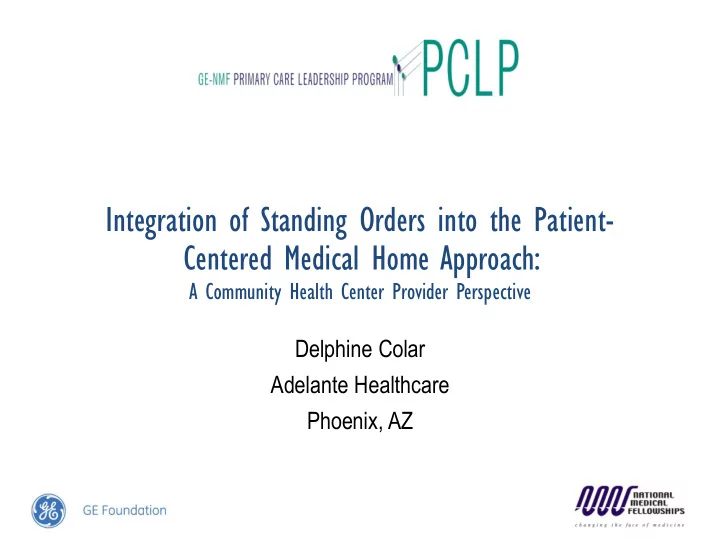

Integration of Standing Orders into the Patient- Centered Medical Home Approach: A Community Health Center Provider Perspective Delphine Colar Adelante Healthcare Phoenix, AZ
Introduction • Standing Orders • Pre-determined set of procedures established by physicians • Carried out by support staff (MAs or nurses) • Does not require physician supervision or approval at every visit • Ex: Immunizations for children
Background - PCMH • Patient - Centered Medical • Key Characteristics Home • Personal physician • Physician directed medical • Team-based approach to practice healthcare • Whole person orientation • Designed by primary care • Coordinated care professionals • Updated in 2014 • Established by the Joint Principles of PCMH in 2007 • AAFP • AAP • ACP • AOA
Methodology • Standing Orders Research • Provider Survey • Chronic Conditions • Assess provider attitude toward the idea of standing • Diabetes orders and its place in • Hypertension PCMH. • Preventative Health • Standing Orders as a • Adults means of • Children • increasing patient compliance • enhancing overall quality of healthcare • Affecting workload and productivity
Results
Results Use of Standing Orders in PCMH Family Medicine 1 0.9 0.8 1 0.7 0.6 0.5 0.8 0.4 0.3 0.6 0.2 1-15 yrs All Specialties 0.1 0 0.4 15+ 0.2 0 Improve Pt Compliance Pt Would Definitely Benefit Effect of Standing Orders on Use of Standing Orders in Workload Across All Specialties PCMH 1 1 0.8 0.8 0.6 0.4 0.6 1-15 yrs 0.2 FM 0 15+ 0.4 OB/Gyn 0.2 0 Decrease No Effect Increase
Discussion • Overall view of standing orders in PCMH among primary care providers is positive • Questions Raised: • Is there a significant difference in perspective among newer and older providers? • Are standing orders really effective in improving patient compliance? • Further Research • Larger sampling of physicians • More extensive study into patient compliance • Taking support staff opinion into consideration – surveying MAs and nurses
Recommendations • Implement the use of standing orders into PCMH • Obtain the perspective of MA/nurses • Standing orders will likely improve the overall quality of healthcare • PCMH will likely improve the overall quality of healthcare
Conclusion • All physicians should want to provide the highest quality of healthcare for all their patients • Standing orders is a way to standardize healthcare so that it is more accessible for all, despite patient’s ability to pay • Use of standing orders will enhance primary healthcare quality and delivery • Standing orders will decrease workload and increase productivity • Use of standing orders will hopefully improve patient compliance
Acknowledgements • GE-NMF PCLP Program & • Ebenezer Kureshi, PA-C Staff • Dr. Shary Borhan • Audrey Bohanan • Dr. Gary Cloud • Lisa Blue • Fellow PCLP participants • Dr. Avein Tafoya • Dr. Doug Campos-Outcalt • Adelante Healthcare Team • Dr. Pavel Petkov
Recommend
More recommend